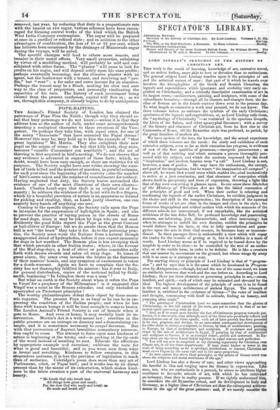POP E-BAITI NG.
THE Animal's Friend Society of London has claimed the patronage of Pope Pius the Ninth ; though why they should as- sail that busy personage we do not know,—unless it is that they address him as the author of bulk, under some misapprehension imputing a zoological character to those creations of the Vice- gerent. Or perhaps they take him, with equal error, for one of the many " Innocents ' that have ascended the Papal throne ? However this may be, they hold up to him the example of " that great legislator "Mr. Martin. They also enlighten their new pupil on the origin of crime : the boy that kills birds, they state, becomes "capable d'assassiner son semblable "; and the art of thieving is first acquired in bird's-nesting. We do not observe that any evidence is advanced in support of these facts; which, no doubt, would have been easy enough, as there are statistics for all purposes. The Society might have sent tables showing the num- ber of birds killed and the number of murders, in parallel columns, for each year since the beginning of the century ; also the number of bird's-nests taken and the number of commitments for robbery. Having neglected that duty, the Society leaves untouched the evidence of one of the most illustrious of their own clients— Lamb. Charles Lamb says that theft is an original sin of hu- manity ; he adduces the evidence of the hand with its five fingers, which by a beautiful provision of nature is an apparatus so formed for picking and stealing, that, as Lamb justly observes, one can scarcely keep bands off anything one sees. Coming to the specific objects, the Society calls upon the Pope to interpose for the suppression of bull-fights in Spain ; and also to prevent the practice of laying poison in the streets of Rome for mad dogs, since it may be taken by dogs who are not mad. Evidently the good folks regard the Pope as the great Centaur or bull-driver of Europe: but we do assure them that the Roman bull not "the beast" they take it for. As to the poisoning prac- tice, the Society must wean the Italians from a natural though exaggerated dread of hydrophobia, before it can expect immunity for dogs in hot weather. The Roman plan is less sweeping than that which prevails in other Italian states ; where, in the fervour of the Mad-dog-days, a host of strirri or police constables sally forth with drawn swords and sabre all stray dogs. In times of great alarm, the army even invades the brutes in the fastnesses of their masters' homes, and any symptom of excitement is taken for a death-warrant. Again we have to complain that the So- ciety has not thoroughly fulfilled its mission : has it sent to Italy, for general distribution, copies of the national ballad by Gold- smith, beginning " In Islington there was a man" ? But what on earth is the Society about when it refers the Pope to Virgil for a prophecy of the Millennium ? is it supposed that Virgil was a saint in the Roman calendar, and only excluded as apocryphal on Protestant principles ? The worthy philanthropists defeat their object by these eccen- • tric vagaries. The present Pope is as busy as he can be in im- proving the condition of the Italian people; and when he has done with human beings it will be time enough to come to brutes. The London Animal's Friend Society is out of bounds when it gets to Rome. And even at home, it may usefully limit its in- tervention. Martin's Act is a well-meant law : cruelties in the public presence are an outrage on decency and a demoralizing ex- ample, and it is sometimes necessary to compel decorum. But with that prevention of flagrant brutalities compulsory interven- tion ought to cease. The attempt to force upon men kindness of action is beginning at the wrong end—is pecking at the tip ends of the weed instead of assailing its root. Educate the affections by appropriate example and exercises; cultivate the taste for what is good and beautiful; and so you wean men from what is brutal and revolting. Kindness to fellow creatures, in this stupendous universe, it is less the province of legislation to teach than of teathetics. Coleridge's poem does more than any act of Parliament, edict, or Papal bull ; and it works less by its direct precept than by the music of its exhortation, which makes kind- ness to the brute creation a part of the universal harmony and beauty.
" He loveth God who loveth best All things both great and small; For the dear God who made and loveth us He made and loveth all."






























 Previous page
Previous page